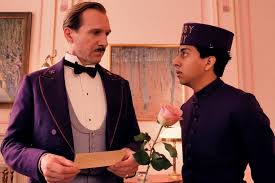By Rob Oldham
“You see, there are still faint glimmers of civilization left in this barbaric slaughterhouse that was once known as humanity. Indeed that’s what we provide in our own modest, humble, insignificant… oh, f*ck it”– Gustave H.
What do you get when you combine an all-star cast spanning three generations of stars, set pieces that would look more appropriate on a Candy Land game board, and the irreverent, although mostly irresistible, wit of Wes Anderson?
“The Grand Budapest Hotel.”

Set in a fictional European fantasyland during the pre-World War II age of fascism, Wes Anderson, the stylish director responsible for “Moonrise Kingdom” and “Fantastic Mr. Fox”, uses a story within a story within a story with a story to tell relate the adventures of Gustave H., the storied concierge at the extravagant Grand Budapest Hotel.
Gustave H. is the consummate gentleman. When he is not bathing in perfume, Gustave spends his time pampering the Grand Budapest’s aristocratic clientele, schooling his young protégé Zero on the art of serving others, or carrying on clandestine sexual liaisons with some of the elderly madams who frequent the resort. When one of these madams, Ms. Madam D, dies mysteriously and leaves Gustave her treasured, but quite ridiculous, portrait “Boy with Apple,” Gustave is arrested for murder and spends the rest of the film trying to clear his name and reclaim the valuable portrait.
Beneath this timeless and largely hilarious plot lays Anderson’s pointed social critique of humanity’s past and its present.
“The Grand Budapest Hotel” is devilishly sarcastic in its portrayal of the European upper-class. Anderson rarely misses a chance to portray them as materialistic, vain, and happily delusional, especially when it comes to the danger of fascism that is simmering under the surface of their perfect little world. Gustave barely registers the existence of a war when he reads the newspaper or when he and Zero travel past legions of tanks amassing at the border of Zubrowka, the fictional country within which the Grand Budapest is located. His guests seem similarly absent-minded as they fret about their own petty affairs rather than the fascist danger that is staring them in the face.
It is in this environment that the character of Gustave H. thrives. His deceptively layered character distinguishes “The Grand Budapest Hotel” from the typical Wes Anderson treatise on exaggerated style. He is a perfect servant to the oblivious aristocracy because of his utter lack of cynicism. Unlike so many of us, Gustave is an idealist. He devotes himself to pleasing the upper class without ever expecting to be admitted to their ranks. What’s more is that he does this not do this because of a desire for money, power, or inheritance. He is shock and awe after finding out that Madam D left him “Boy with Apple.” Gustave is perfect servant because he was born a perfect gentleman. Even when he finds himself in prison for Madam D’s murder, he never forgets that his place in the world is to push a food cart around and make sure that his fellow humans are as comfortable as possible.

Of course modern viewers have no trouble spotting the naivety in Gustave’s world view. They know that it won’t be long before Europe is engulfed by war and destruction. Soon enough, there will be no place for a true gentleman in the world. It is a world of firebombing, suffering, and death camps, not gallantry. The inevitability of this is mirrored in the hotel’s downfall. The film shows the Grand Budapest aging over time, eventually dissolving into a decayed ruin with few guests. The magic that Gustave H. brought is gone, and the hotel, and thus the world, slowly dies as time carries on.
It is in this contrast between wreckage and jubilancy that Anderson buries his central theme: disguise. The pompous European aristocracy puts on a show of being fancy and proper. The hotel itself is a glamorous front that will be soon be ruined by war. Only Gustave H. seems to have any sincerity. But he even sometimes lets on to an ingrained cynicism about the world and fails to display his normal cheery optimism. Anderson slides modern cursing into Gustave’s normally proper way of speaking in order to show that he too is affected by humanity’s fall into decadence. For Wes Anderson, disguise is the only thing that separates his prim world from the Hobbesian vision of natural humanity embroiled in turmoil.
Ultimately though, Gustave H. is a glimmer of hope in a dark world. He lives his life with honor and eventually dies while trying to protect his friend Zero from the fascist authorities. At this point the audience might gather that the world is continuously sliding into decline and the wars of the 20th century destroyed all of the innocence that we still had. A quick glimpse of the news might vindicate this world view. The news is saturated with horrors like ISIL beheadings, the slaughter of Palestinian civilians in West Bank, and racist police officers unaccountable to the law. Any casual observer might yearn for the world that Gustave represents instead: a world of class, honor, and service.
“Nonsense,” says Anderson. Years after Gustave’s death, the elderly Zero returns to the failing hotel and recounts the events of his life to an unnamed author. The author marvels at Gustave H. as the last real symbol of an honorable world and the good society that humans strive for, but have lost in the last century. Zero’s response is this:
“To be frank, I think his world had vanished long before he ever entered it—but I will say: he certainly sustained the illusion with a marvelous grace.”
Gustave’s good nature was just another disguise for a world and a society that has long since lost its innocence.
If nothing else, Anderson beautifully captures the disguise that all of humanity uses to cover its ugliness. Some may take issue with his quirky and exaggerated style, but no one can deny the power of his message.


